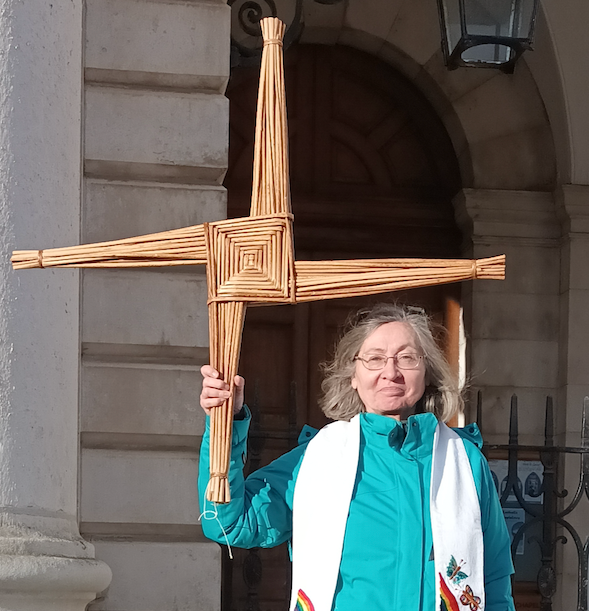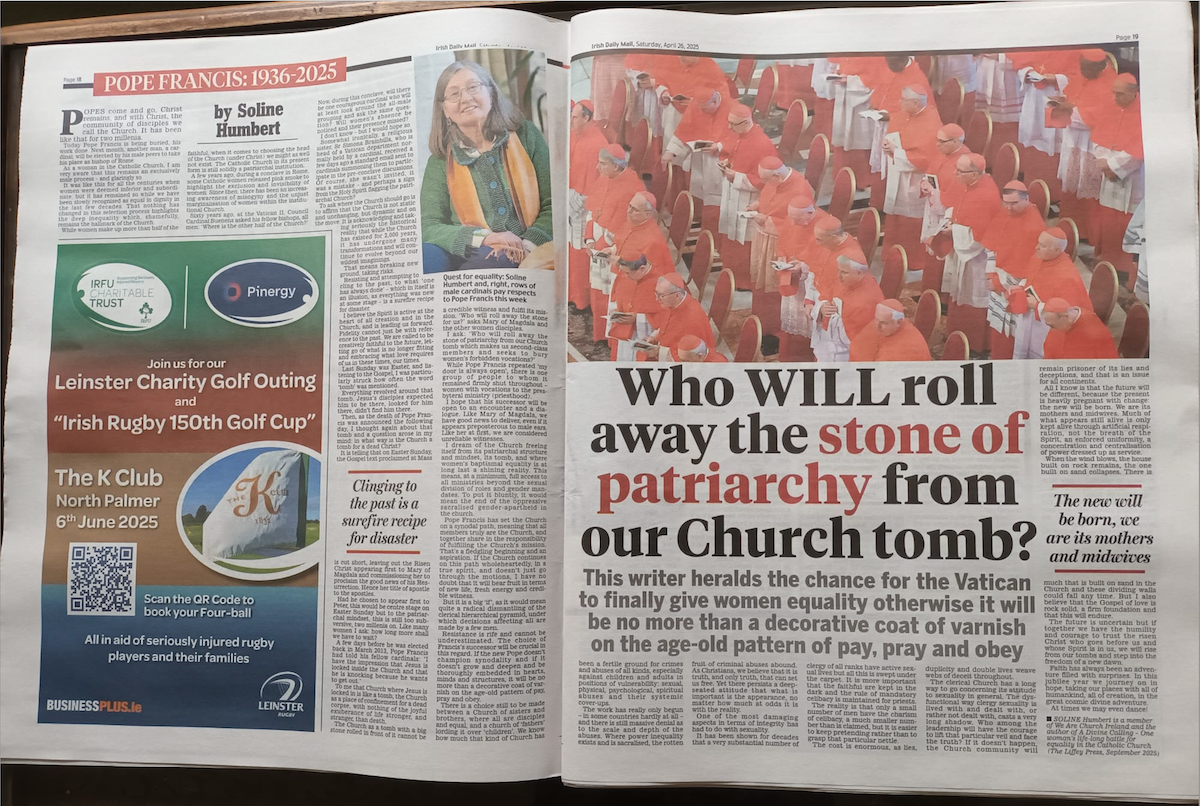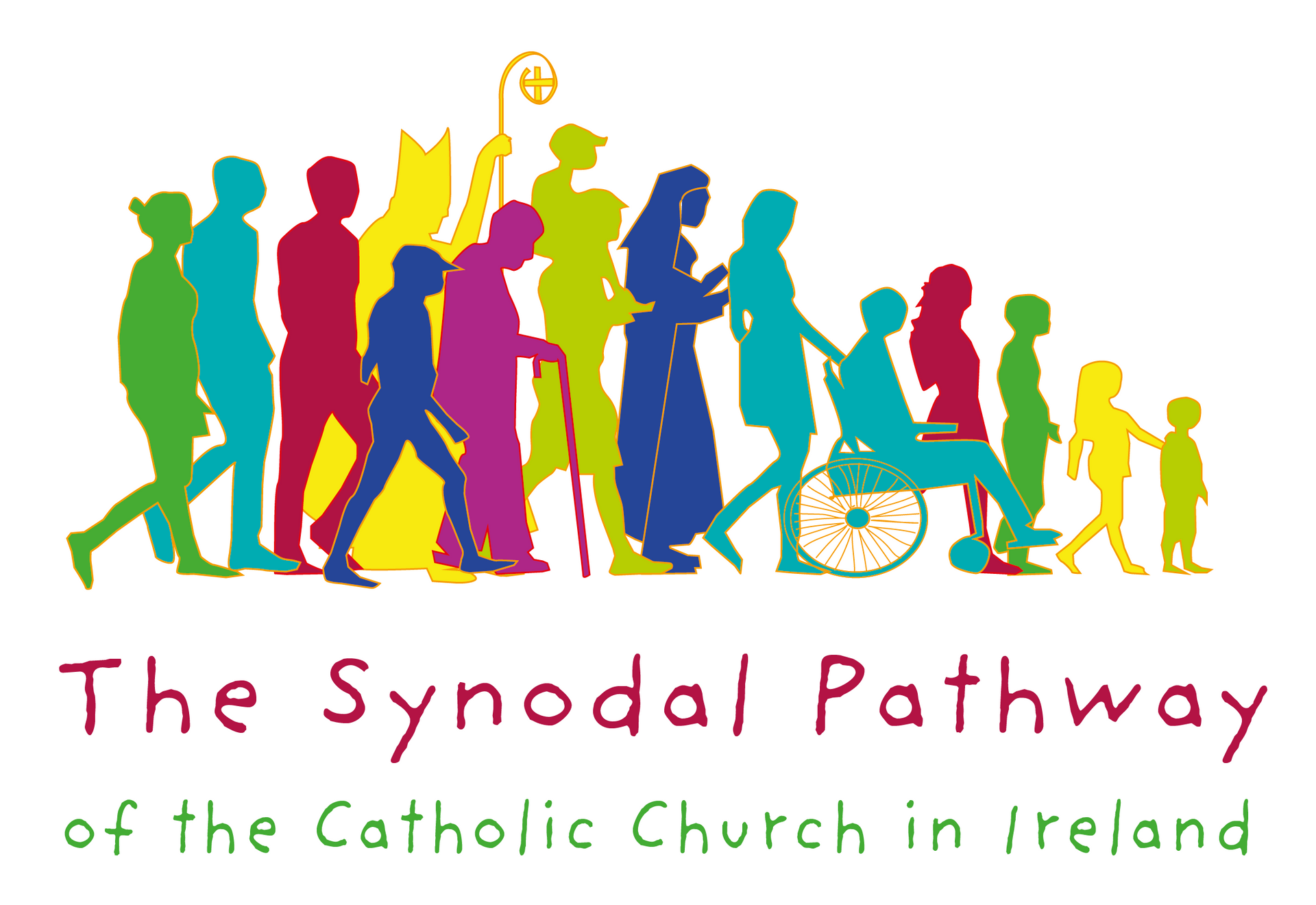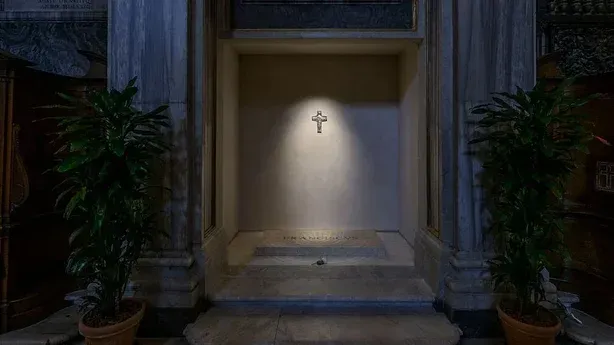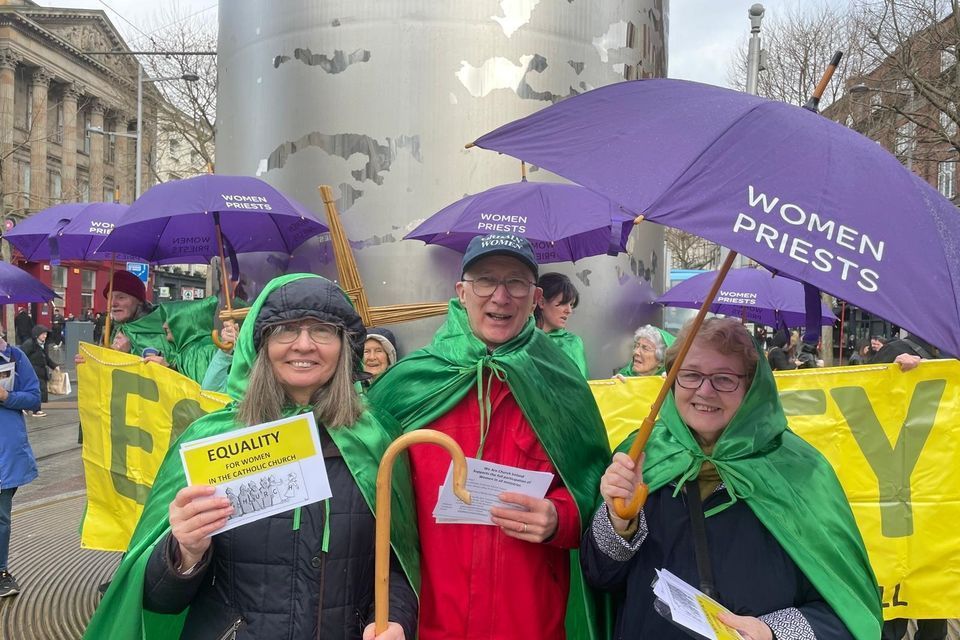BEING DENIED THE DISCIPLESHIP OF EQUALS
Full text of Mary McAleese's speech at Spirit Unbounded in Rome
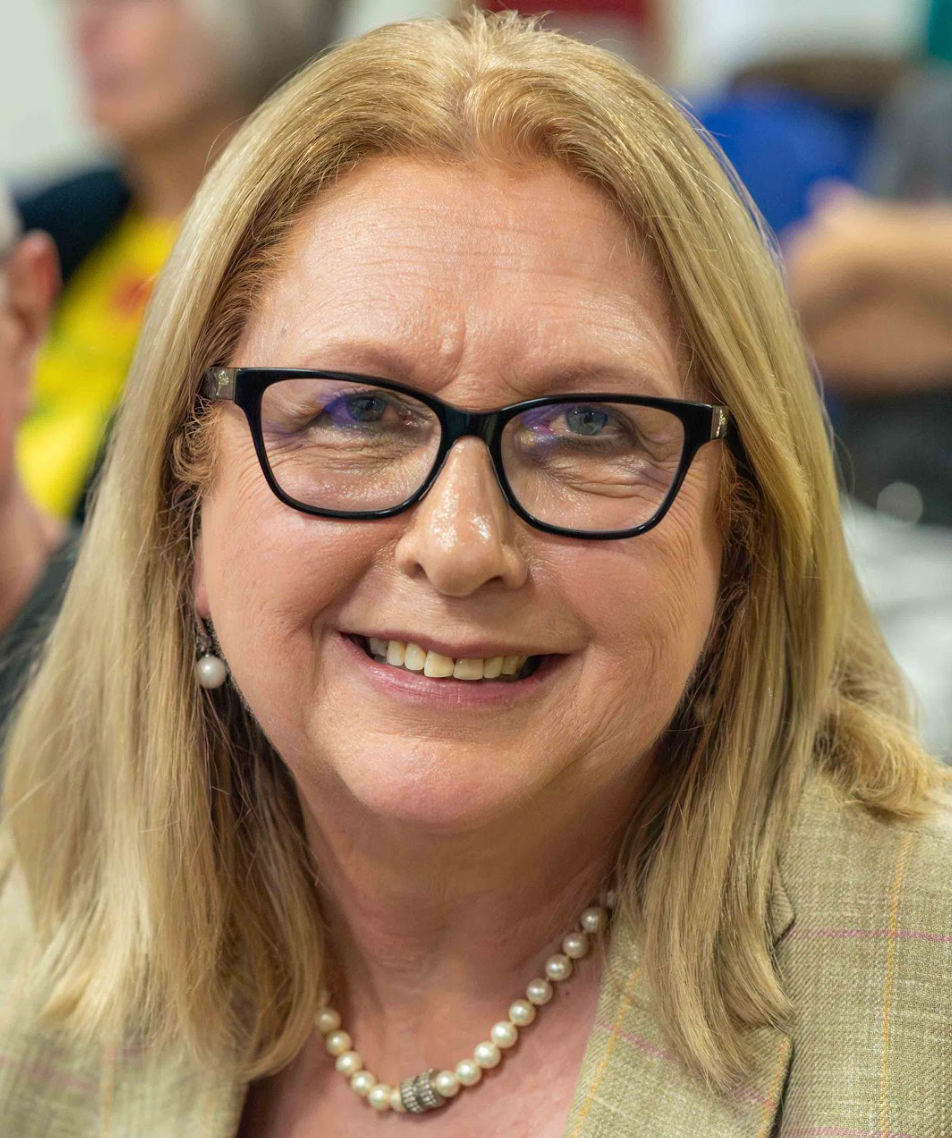
Full text of Mary McAleese's speech at Spirit Unbounded in Rome
DR. MARY MCALEESE
ROME
EMBARGOED UNTIL 17.05 UK/18.05 ROME TIME
FRIDAY 13 OCTOBER 2023
BEING DENIED THE DISCIPLESHIP OF EQUALS
We are gathered here in this forum because we believe that the God who created rampant human diversity, created us as equals, all of us. We believe that Christ created a discipleship of equals, all of us. We believe that inequality scandalizes Christ. We believe that our human rights are an expression of the fundamental freedoms that are central to the equality which is God’s inalienable gift to all his children.. We believe that the Catholic Church which should be and could be an exemplar of that equality and respect for human rights is not..
Instead the biggest Christian Church in the world, the biggest ngo in the world, the only faith system to have representative status at the United Nations, a key influencer of laws, attitudes and cultures on five continents, is languishing in a deepening credibility crisis precisely because it has failed to reform an out-dated internal structure of governance, teachings and laws in which inequality is embedded, in which the human rights of members are routinely restricted, especially the fundamental intellectual freedoms of expression, opinion, conscience and religion including freedom to change religion and in which gospel values are impeded as a consequence.
The Second Vatican Council seemed to mark a change from the old Church law in which as Robert Kaslyn notes: “the Church was perceived as a society of unequals depending on whether one had received ordination or not” Lumen Gentium (32) spoke of the “true equality regarding dignity and action of all the Christian faithful” and Gaudium et Spes (29) wrote that all men and women share a basic equality which “needs to be increasingly recognised”. However as the late Hans Kung observed “In spite of the impetus of the Council, it has hitherto not been possible to decisively change the institutional -personal, power-structure of the Church leadership in the spirit of the Christian message” .
Pope Francis’ initiation of a synodal journey was prompted by the rapidly escalating disillusionment of the faithful for many reasons includint the persistence of stark internal inequality and lack of respect for the human rights of Church members within the Church. We wish the Synod of Bishops well as it takes place here in Rome this month and again next year, but its structure, notwithstanding modest lay and female participation, is still modelled on a discipleship of unequals, with evident unease as to how to deal with what has been a powerful show of lay strength in the synodal journey so far, especially its determined push towards a discipleship of equals.
Emboldened by the courage of the prophetic German Catholic Church’s egalitarian synodal process, inspired by the openness, equality and freedom of speech of the globally accessible Root and Branch lay led synod in 2021, the People of God throughout the world have participated in a prayerful debate and discernment synodal process , initiated by Pope Francis, spanning five continents and virtually all episcopal conference areas in preparation for the two Synod of Bishops Synods on Synodality, the first of which is now taking place here in Rome. They have turned the Pope’s Synodal process into the Peoples synodal process and now the test is- will this Synod of Bishops stay faithful to the discernment of the people of God.
Although initiated by Pope Francis, he himself tried unsuccessfully to steer synodal discussions away from controversy but the laity resolutely insisted on their right to debate contentious issues even those on which the magisterium has fixed contradictory views often backed by tenuous assertions of infallibility. Until now the People of God have had no internal church forum in which to have such discussions let alone have their expressed views distilled into a working document for discussion at two Synods of Bishops. Pope Francis can certainly claim some credit for that but lay pressure can claim even more credit. Under that pressure the Pope recently reversed a very hardline message published with his approval by the then Congregation of the Doctrine of the Faith in 2021 which banned Church blessings for married gay Catholics. The ban and its dreadful unChristian language which said that married gay Catholics were incapable of receiving or expressing God’s grace provoked widespread outrage among the People of God, lay, clerical and episcopal. That same pressure is visible too in the Pope’s decision to permit the participation of a token number of women and lay synod members for the first time and to give them voting rights. Given the resounding demand from the global synodal process for equality for women in the Church, it is surely no exaggeration to suggest that had the Synod of Bishops opened this month with no concession to that voice it might just as well have closed up shop on day one. Ironically the inclusion of a small cohort of women merely highlights the extent of the continuing gender imbalance at the core of Church governance. It also highlights the resistance to equality in all its fullness. Equality is a right not a favour. The women attending the Synod on Synodality are there as a favour not as a right. Well-intentioned though that may be, it is not enough.
It is clear that the synodal discernment of the People of God includes serious levels of good faith dissent from magisterial teaching on among other things, gender equality, female ordination to priesthood and deaconate, inclusion of LGBTIQ+ Catholics, church teaching on human sexuality, co-responsibility with laity, compulsory celibacy, transparency and accountability of governance, credible safeguarding of children, eucharistic access for divorced and remarried Catholics. These and a raft of other issues prayerfully discerned by the People of God now confront the Synod of Bishops, which according to Cardinal Grech, is asked to carry out “a careful discernment of the contributions” of the synodal processes so far. We have to hope it will also be a courageous discernment for anything less will signal duplicity not true discipleship. Veiled discussions behind closed doors which are subject to confidentiality and publishing restrictions are disappointingly old school and smack of reluctance to trust even the Holy Spirit.
So- we are here to showcase what a discipleship of equals looks like; what a way of being Church looks like when we meet prayerfully, in Christ, as equals, with complete freedom of speech and opinion, openness to the Holy Spirit and open doors out to the world. Our ambition is for a Church where magisterial teaching is proposed not imposed, where teaching is arrived at through a process where what affects all is discussed by and decided by all, where Church members are volunteers not conscripts, where all are equal regardless of gender or lay or clerical status, where canon law acknowledges our God given human rights as set out in the Universal Declaration of Human Rights (1948) and the UN Convention on the Rights of the Child (1989) to which the Holy See is a State Party- those rights include freedom of speech, belief, conscience, opinion and religion including the right change religion. None of that is how things are in Church teaching and canon law.
Let us stop and consider how things are and why they are as they are. To do that we have to go back to Baptism for it is by Baptism not birth that we become not just members of the body of Christ but members of the Catholic Church according to canon law. Listen to these words from the Code of Canon Law 1983. By virtue of our baptism we are always “obliged to maintain communion with the Church” (Canon 209); we are bound to follow with Christian obedience those things which the sacred pastors …declare as teachers or establish as rulers of the Church (212 §1); while we have a right to manifest our opinion to each other and to our sacred pastors on matters pertaining to the good of the Church we must do so “without prejudice to the integrity of faith and morals and with reverence toward our sacred pastors ( Canon 212 §3); those engaged in the sacred disciplines like theologians or religious scholars have “just freedom of enquiry” and of expressing their opinion prudently “while observing submission due to the magisterium of the Church (Canon 218); ecclesiastical authority can “direct the exercise of rights” of Church members (Canon 223 §1); in exercise of our fundamental freedoms in civil law we are “to heed the doctrine set forth by the magisterium of the Church (Canon 227). The language of these canons is the typical language of hierarchical, top down control. It is not a language which honours in any way our fundamental intellectual freedoms. Quite the opposite.
Although promulgated some thirty-five years after the Universal Declaration of Human Rights (1948) the 1983 Code of Canon Law reads as if it never heard of our fundamental, inalienable God given human rights, as if any rights we have are at the discretion of the magisterium and theirs to dispense as favours as they see fit. There is a reason for that and the reason is the dependence of the magisterium’s authority over us, on our Baptism and in particular our so-called baptismal promises which canon law says bind us for life to Church membership and passive obedience to the magisterium and Church laws.
For some 84 percent of us Church members Baptism occurred when we were non-sentient infants. I take no issue with Infant Baptism itself when it is seen a God’s gratuitous gift of membership of the body of Christ, a miraculous source of grace which we are at liberty to draw down or not. But canon law attaches to Baptism a crude list of man made rules which turn our christening into a lazy form of conscription which Christ never intended.
To those literate in human rights law the very idea that non-sentient infants can make promises is risible and very troubling. The very idea that a childhood ceremony which we could not comprehend, irrevocably binds us for life to a faith system and obedience to teachings which comprehensively impact our lives but into which we have no input is risible. Currently canon law makes no provision for the infant baptised to validate their Church membership when mature enough to do so. The sacrament of Confirmation could do so but it does not- instead it maintains the fiction of baptismal promises by asking us to renew them! One fiction feeds another layering up a fake theology which is no more than a construct of convenience to justify elite autocratic control and guarantee our subservience.
Canon law offers no exit strategy, brooks no dissenters, but rather provides serious penalties for those who leave or who oppose Church teachings. That this contradicts our God given human freedoms especially the freedom to make up our own minds is clear to an educated People of God and indeed many today exercise their human right to leave or protest and critique magisterial teaching. Canon law also demands that Catholic parents raise their children in the faith and that in itself would not be problematic if canon law also honoured the child’s right when mature enough, to exercise its freedom of religion including freedom to accept its parents faith or to change religion and its right to the education and information necessary to make informed choices. These rights are enshrined in both the UDHR and the UNCRC. Canon law allows none of them even though the Holy See is obliged as a State Party to the UNCRC to respect the human rights of the child to intellectual freedom as it matures into adulthood. It does not currently do so.
Unless you are one of the few who entered the Church as an adult catechumen, there never were baptismal promises. They are a fiction. And that is the “appalling vista” the Magisterium simply cannot face because it means that its authority as currently understood and exercised, is legally and morally questionable. It belongs to an old disintegrating empire of generals and conscripts and it stands in the way of being Church that is a discipleship of equals and volunteers, members by choice not compulsion. There is not even the merest hint that this reality is up for discussion at the Synod of Bishops. Pope Francis’ clearly still operates out of the “compulsion model”. Listen to his very recent words on the teaching which excludes women from ordination. It is not a “dogmatic definition”. It is a “definitive statement”. The exact nature of definitive statements “is not fully developed”. Nonetheless it “must be adhered to by all” the faithful. And “it cannot be publicly contradicted but it can be studied”. I am here to say we have studied it and deeply and as a result are here to publicly contradict what our studies tell us is sexist codology dressed up as what is threadbare theology. Moreover, dear Holy Father, those little words “must” and “cannot” are utterly offensive to our God-given freedom of expression, opinion and conscience.
Sad to say you will find no mention of a “discipleship of equals” in the working document for the Synod of Bishops. Absent too are any positive references to the human rights of Church members. Instead you will find scathing dismissals of human rights. The Working Document claims there is a risk of a “frenzy of individual rights claims that inevitably cause fragmentation rather than unity” and it warns of the need to guard “against falling into the abstractness of rights”. This dismissive attitude to serious engagement with the human rights of Church members is nothing new but it is disappointing at this crucial stage in the synodal process to find in the Working Document vestiges of attitudes to individual human rights more reminiscent of 19th century Popes Gregory XVI and Pius IX who dismissed as “insanity” the idea that individuals had the right to freedom of conscience, religion, opinion and expression.
Yet the Working Document claims the Synod on Synodality is designed to “open horizons of hope for the fulfilment of the Church’s mission” (DCS 6). We are here to welcome the opening of horizons of hope but to point out that the Church’s embedded inequality and restriction on our human rights have shut down horizons of hope time and again thanks to wrong-headed teachings which have imposed misery on so many. They provoked a Church history which even allowing for the good work of the People of God, over and over has dishonoured, even impeded, Christ’s mission.
What do we define as the Church’s mission and where does the discipleship of equals come from? The answer is simple. In St Matthews Gospel we find Christ’s most important and terse final instructions, his Great Commandment and Great Commission. The Great Commandment on which all the law hangs, he said, is to love God with all your heart and soul and mind and to love your neighbour as yourself. (Matthew 22:35-40). The Great Commission- Go make disciples of all nations. Teach them what I have commanded you. It was and is a clear and unqualified call to a discipleship of equals, volunteer followers who journey together with a mission not to coerce but to persuade people of the transcendent power of love lived as Christ intended. A discipleship of all genders, all peoples, powered by a divine grace capable of ending enmity and bringing peace on earth among all God’s children. That was the plan. It still is, though not yet realised or even close.
We are committed to it but wonder given the extent of the institutional resistance, whether Church leadership is ready to face the extensive internal culture change required for a discipleship of equals, ready to face a Church in which members human rights are no longer constrained by canon law or the Magisterium, where communion can cope with controversy, where dissent is healthy, where what affects all is decided by all, where a catechesis of obligation is replaced by a catechesis of invitation and persuasion, where a reformed magisterium serves and supports the People of God relying on pastoral persuasion not forced submission.
The human rights that provoke such resistance from Church leadership are set out in the Universal Declaration of Human Rights of 1948 and the United Nations Convention on the Rights of the Child 1989, neither of which is mentioned in the Synodal Working Document though the Holy See encouraged the former and is a State Party to the latter.
It was in 1948, in the aftermath of the horrific savagery of two world wars and the evil of the Holocaust. there arose again the cry of Rachel weeping for her children, all God’s children, especially the generations to come. In response, there came the insistent words of the Universal Declaration of Human Rights which set out for the first time in human history the birthright of all to the “equal and inalienable rights of all members of the human family”. The Declaration did not invent that equality or those rights. It merely stated them for they are as old as creation itself . They are God’s gift to his children and they are as the Declaration says “the foundation of freedom, justice and peace in the world. In 1948 the world needed to be reminded of that. It needs it today as much as ever and so we remind the Church of its mission , Christ’s of freedom, justice, love and peace, calling to mind again the words of the poet Sir Stephen Spender who bitterly asked in his poem War God,
“Why cannot the one good
Benevolent, feasible
Final dove, descend?”
He answers his own question:
For the world is the world
And not the slain
Nor the slayer forgive
And it writes no histories
That end in love.
Yet under the waves’
Chains chafing despair
Love’s need does not cease.
Yet we Christians dare to believe that Christ came into the world, precisely to teach us how write histories that end in love , to answer love’s need by relating to each other in radical and generous ways, to love one another as ourselves, to love one another as he loves us and so transcend all the self-inflicted human ugliness by writing a history that ends in love, that severs the chains of despair. Regrettably Christians and the Catholic Church among them have yet to write a history that ends in love. Too often our Church has been implicated in histories of rigid judgmentalism that ended in adding to human misery. Too often today as in the past, its skewed teachings hurt rather than heal.
Pope John XXIII seemed to understand that the post-war juncture was a cross-roads for the Church. He launched the most remarkable and most neglected encyclical of the twentieth century Pacem in terris and the most significant event in the modern Church the Second Vatican Council. Pacem in terris identified some twenty five inalienable human rights which arise by virtue of being human and which «draw their authoritative force from the natural law» including “The right of all (including women) to take an active part in public affairs”, and the rights to freedom in seeking truth and to freedom of expression and opinion .
Sadly Pacem in terris rather like the Council which followed it, never became the powerful inspiration it could have been in terms of developing a charter of the internal human rights of Church members, a discipleship of equals.
Instead the post-conciliar Church became bogged down for twenty years in drafting a new Code of Canon Law during which time, in fairness, the drafters attempted but failed to deliver a Charter of rights of the faithful. They were pushed back by the intervention of Saint Pope John Paul II. The late Cardinal Castillo Lara’s words summarised the magisterium’s attitude to individual human rights saying that the. “The basic attitude of the faithful is not that of vindicating rights. The Christian is placed before God in a fundamental relationship of filial obedience” . Unfortunately for Church members the new 1983 Code of Canon Law placed them where canon law had always placed them, in a fundamental relationship of obedience, not to God but to the all too human and flawed, Magisterium.
On his way back from the World Youth Day in Lisbon last August when challenged by journalists about the exclusion of women and the demonising of LGBTIQ+ Catholics by the magisterium, Pope Francis told journalists that “The church is open to everyone but there are laws that regulate life inside the church.” And that dear Holy Father is precisely the problem. We dare to suggest that the laws that regulate life inside the Church do not all bear scrutiny, are often oppressive and are not consonant with the Universal Declaration of Human Rights and the UN Convention on the Rights of the Child. They are at odds with a God of love and a discipleship of equals.
The synodal process offers a real opportunity to recalibrate the shape of internal laws, structures and relationships, to drive towards a Christ centred discipleship of equals but only if the magisterium listens humbly and recognises that a new leaven is at work among the People of God. It is now apparent that the People of God are no longer bending the knee to the Magisterium. Beginning in the West they are now actively dismantling what is widely accepted is a dysfunctional magisterial culture and they are doing it from the bottom up, hollowing out misogynistic, homophobic and legalistic hierarchical authority by challenging, ignoring or bypassing it.
The Magisterium saw today’s meltdown coming its way as far back the as the 1960’s with the widespread rejection of Humanae Vitae’s ban on artificial contraception. To calm that storm and the many storms that followed, the Magisterium resorted to its familiar default positions all of which have proved to be counterproductive. It dug in on doctrine and praxis, railed against aggressive secularism, blamed external forces, blamed poor catechesis, poor evangelisation, characterised itself as a blameless victim, accused critics and even abuse victims of bad faith, circled the curial wagons and silenced clerics who spoke out in support of reform. When none of the above worked and the noise level of dissent got even louder it resorted to the tactic of what has been termed “creeping infallibility” the sleight of theological hand by which it insinuated without any formal Extraordinary declaration that hotly contested teachings were infallible, so closed to discussion and just had to be passively obeyed: teachings such as the ban on artificial contraception, Church teaching on homosexuality and marriage, euthanasia, and the exclusion of women from ordination to the priesthood. Nothing worked, the debates just grew more legs.
Instead actions designed to crack the magisterial whip, cement magisterial authority, silence dissent and promote obedience of the faithful provoked a scholarly defiance among the faithful which has almost soundlessly dealt infallibility a fatal blow while stoking the fires of reasoned discontent that faced Pope Francis when he assumed office and which now face his Synod. In the West clerical abuse and coverup revelations speeded up the evaporation of trust, vocations, finance and people in pews. While in Africa and Asia, Church numbers and vocations looked healthy, the contagion nonetheless was capable of spreading as the reports from diocesan and religious institutions’ Synodal discussions across five continents have since revealed.
Something had to give and quickly. And it did- thanks to the chorus of internal discontent we experienced the sudden onset of synodality. A magisterium that previously only talked among themselves as equals and talked down to us as passive receivers of their distilled discernment, was now obliged to listen to us, to walk together with us as Church members, to discern together the will of the Holy Spirit. Vestiges of the old culture of autocratic control were evident however in the crass papal and curial attempts to muffle the German synod and restrict the current synodal agenda to the anodyne and non-contentious. They did not work either.
It was too late. The synodal genie was out of the bottle and it was in the hands of men and women who neatly fit Seamus Heaney’s description in a different context of “intelligences brightened and unmannerly as crowbars”. Their parents generation he described as “living under high banked clouds of resignation. A rustle of loss in the phrase “Not in my lifetime”. The new well-educated generation would not be so submissive. He warned of the subterranean tidal wave of rebellion that was forming: “What looks the strongest has outlived its term. The future lies with what’s affirmed from under”.
We are here to keep the ongoing process honest and faithful to the powerful spiritual and theological discernment “affirmed from under” by the People of God. We are here to assert that there is a widespread desire evident in the diocesan and national synodal reports, for a Church which is a discipleship of equals. We are here to highlight the absence from the Working Document for this Synod of Bishops of an acknowledgment that as Christians we are a discipleship of equals and entitled to respect for our human rights in the Church’s internal sphere. The gravitational pull of resistance to change is strong but we are here because we believe change is possible and essential. We are here to encourage the Synod of Bishops to capture the spiritual zeitgeist and reorient the Church towards its Christian mission of a discipleship of equals which may yet write a history that ends in love.
Words will not be enough. Reform will require a new legal infrastructure which unequivocally accepts the principle of equality of all Church members and their inalienable and indivisible human rights. Church personnel will need training in internalising the principles of equality and intellectual freedoms at all and especially the highest levels of Church leadership.
Church governance structures will have to be based on equality. It will need agreed plans, programs, measured outcomes for the delivery of equality, inclusive decision-making and accountability mechanisms, if is it to harness the energies and talents of all its members, if it is to truly honour the mission Christ gave the Church, and open the horizon of hope the Synod is praying for.
Ironically as I mentioned earlier, in the external forum the Church was instrumental in bringing about the Universal Declaration of Human Rights in 1948. It was among the very first State Parties to ratify the 1989 Convention on the Rights of the Child. These once dynamic engagements completely and deliberately lost momentum at magisterial level in recent decades, but they were in fact consistent with the development and expansion of Catholic Social teaching since Leo XIII’s famous encyclical Rerum Novarum (1891). It is seen as marking not only a watershed in the Church’s relationship with international human rights discourse but a reconnection with early Christian teaching which had been drastically interrupted by a millennium of rabid Church politico/religious imperialism culminating in Pius IX’s infamous Syllabus of Errors which roundly decried individual human rights and promoted an arrogant tin-eared clerical autocracy.
In our time we have heard the insistent voice of Pope Francis strong in defence of social justice including our responsibility to reverse man-made climate change and to care for the poor and the migrant. At a Pan American Judges summit on social justice held in the Vatican in 2019 Francis spoke in uncompromising terms of the unacceptability of “policies that lead to the acceptance and justification of inequality and indignity”. These words resonate strongly with international human rights discourse since 1948. But they are mostly addressed to the world at large, to the external sphere where the Church operates as a global moral force. Such sentiments and insights are unfortunately absent from the internal Church sphere where members encounter the full blast of the double-standards of the Church’s magisterium. It is time to turn the human rights spotlight inwards to magisterial teaching, to canon law, to governance structures, to decision making bodies, to discern and to ditch what is problematic and to do so in a thoroughgoing dialogue with the faithful.
Equality and human rights are the oxygen that allows us to breathe as free men, women and children as God intends. They are the unified vision of and for humanity that makes inequality, injustice and oppression anathema to Christians. They push us to courageously challenge anti-semitism, islamophobia, racism, slavery, sectarianism, sexism, bigotry, exclusion, homophobia, zenophobia, greed, exploitation, autocracy, censorship, imperial war-mongering, carelessness with the earth, and all the man-made weapons that foment disunity and disharmony among God’s people. We are missioned to challenge them whether we find them in the external world or internally within the Church.
Today we see a Church that is plummeting erratically on one wing when it could be soaring steadily on two. A discipleship of equals will reveal and release the grace that flows from flying on two wings, powered by energies the magisterium currently wastes. The message to the Synod of Bishops is clear. The Church’s future is either nothing about us without us or without us there will be nothing but an empty space where the Church once was.
The high banked clouds of resignation that Seamus Heaney wrote of are as he says nowadays “edged more and more with brassy thunderlight”. Trusting as we do in the Holy Spirit we have no fear of a synodal thunderstorm because when it is over we believe there is the possibility of a refreshed landscape where the vanities of an imperial hierarchical history are washed away, where our God reigns in love and we walk his path together in a dynamic discipleship of equals, and where for the first time in human history, we may just make a history that ends not in crucifixion but in love.
